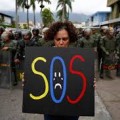By Frank V. Vernuccio, Jr., J.D.
The socialist government of Venezuela endured yet another self-imposed embarrassment last month when its foreign minister, Delcy Rodriguez, pushed through a cordon of police in an unsuccessful attempt to attend a Mercosur meeting which had already suspended her nation from participation due to its extreme economic mismanagement (Mercosur is a sub-regional association, formed in 1991, to increase trade and diplomatic relations. It consists of Brazil, Paraguay, Uruguay, and, until December 1, 2016, Venezuela).
Venezuela’s once promising economy was essentially destroyed by its hard-left government, despite the vast oil wealth possessed by the nation.
Joan Grillo, writing for Time Magazine notes that Venezuela “was once the richest country in Latin America. Now it’s falling apart…in a country that sits atop the world’s largest known petroleum reserves, hungry citizens wait on their assigned day for whatever the stores might stock: with luck, corn flour to make arepas, and on a really good day, shampoo.” Soap and toilet paper are items so scarce that they have become coveted commodities.
The American Enterprise Institute (AEI) notes that “As of the end of 2015, Venezuela’s proven oil reserves (301 billion barrels) were nearly 13% greater than oil reserves in Saudi Arabia (267 billion barrels) and about 5.5 times greater than America’s (55 billion barrels). Despite having more oil reserves than Saudi Arabia, and in fact more proven oil reserves than any country in the world (8 times more than the US), oil-rich Venezuela’s economy is imploding and collapsing under the crippling burden of socialism, and economic conditions there have deteriorated so dramatically that they probably now qualify as the “economic apocalypse” that some left-leaning economists were predicting just a few years ago would never happen in Venezuela.”
The socialist regime ignored all financial common sense and both squandered its energy wealth while simultaneously suppressing other economic endeavors. Now, following a dip in energy prices and the harsh restriction of other financial activities, Venezuela finds itself enduring major food shortages. Its citizens are seeking to find nourishment by traveling to Brazil, but the Venezuelan currency has become close to worthless. AEI found that there have been incidents of zoo animals being slaughtered for food. Students are reportedly fainting in class from malnutrition. Food lines are eight hours long. In further evidence of nightmarish conditions, there has been a significant increase in the number of women getting sterilized, because there is neither food nor funds to provide for children, and standard birth control has become unavailable.
In addition to severe shortages of food and birth control, The Council on Foreign Relations (CFR) found that that “Severe…medicine shortages, soaring crime rates, and a government crackdown on the opposition have sparked widespread protests. The country’s economy was expected to contract 10.1 percent this year, up from 5.7 percent in 2015, making it the worst performer among economies tracked by the World Bank. Inflation hovered around 720 percent, and as many as 76 percent of Venezuelans live below the poverty line, up from 52 percent of the population in 2014, according to a recent study.”
CFR quotes Harvard economist Ricardo Hausman’s analysis of what went wrong. Venezuela’s socialist leadership “did not use the massive oil price boom between 2004 and 2013 to put money aside for a rainy day,” and instead “used the boom to expropriate large swaths of the economy, impose draconian foreign currency and price controls, and to subsidize imports. All this weakened the economy and made the country more dependent on imports, which Venezuelans can no longer afford.”
Cuba, Latin America’s most well-known socialist regime, frequently blamed the U.S. embargo for its problems, despite the reality that it was its addiction to left-wing economic practices that caused its dilemma. Venezuela has no such excuse, exposing the inherent problem of socialist economics.















Follow Us